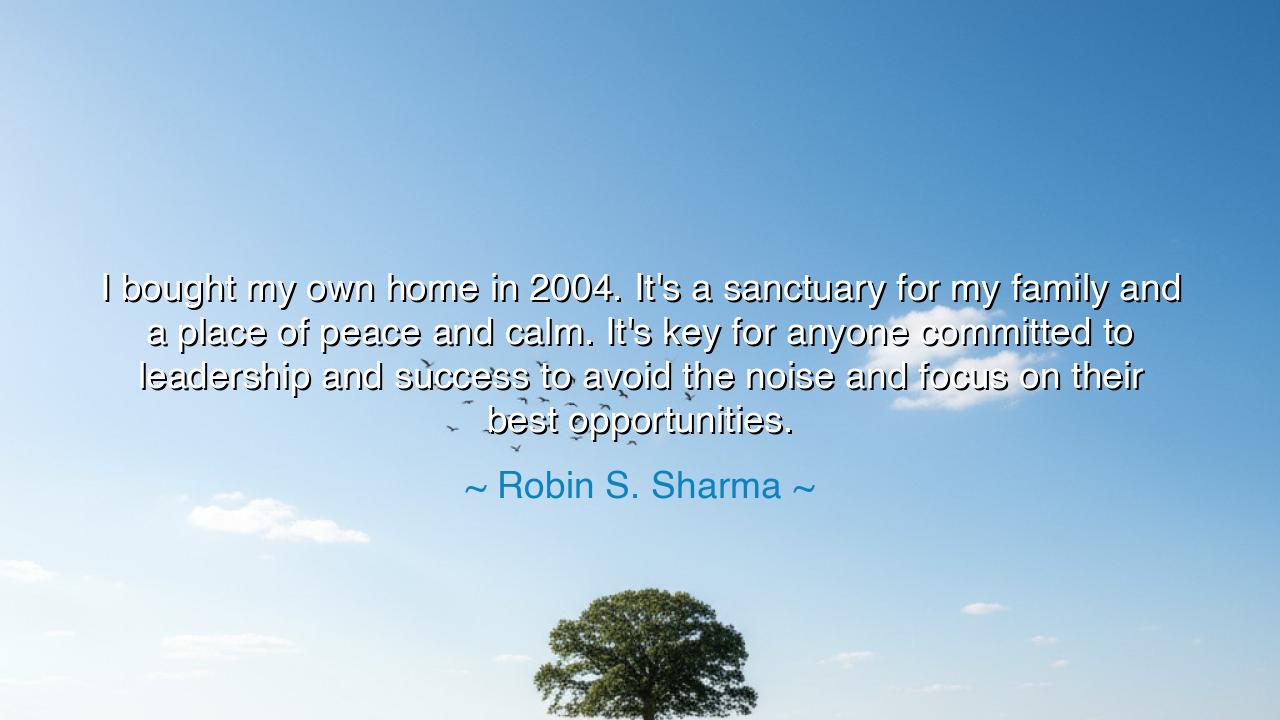
I bought my own home in 2004. It's a sanctuary for my family and
I bought my own home in 2004. It's a sanctuary for my family and a place of peace and calm. It's key for anyone committed to leadership and success to avoid the noise and focus on their best opportunities.






There is a sacredness in the words of Robin S. Sharma, a man who has walked among leaders and seen the inner architecture of greatness. When he declares, “I bought my own home in 2004. It's a sanctuary for my family and a place of peace and calm. It's key for anyone committed to leadership and success to avoid the noise and focus on their best opportunities,” he speaks not merely of walls and roofs, but of sanctuary — a space where the soul may breathe, the mind may sharpen, and the spirit may remember its purpose. For in a world that clamors endlessly, silence is not a luxury; it is the forge of wisdom.
The origin of this truth lies in the ancient practice of retreat. Every sage, every warrior, every true leader has known the value of withdrawing from the din of the world to cultivate inner strength. The monks of old sought their mountains; the philosophers their gardens; the poets their quiet desks by candlelight. To avoid the noise is to protect one’s inner flame from the winds of distraction. Without such stillness, even the brightest mind becomes clouded, and the noblest vision, scattered. Sharma’s home, then, is not merely a dwelling — it is a modern monastery, where clarity is born from calm.
To create a place of peace and calm is to make a covenant with one’s higher self. In this space, we do not merely rest; we renew. The modern leader, besieged by messages, deadlines, and demands, must learn what the ancients knew: that to lead others, one must first lead one’s own mind. The home as sanctuary becomes a symbol of balance — between outer ambition and inner serenity, between action and reflection. It is where the storms of the world lose their power and the voice of purpose can once again be heard.
History too offers its lessons. Consider Marcus Aurelius, emperor of Rome, surrounded by power, conflict, and endless responsibility. Yet even in the chaos of empire, he found his sanctuary — not in marble halls, but within his own discipline of thought. His private writings, later known as Meditations, were his refuge, his inner home of calm reflection. From this place of stillness, he ruled with wisdom. Like Sharma’s home, it was the space where noise was silenced and focus restored.
To focus on one’s best opportunities is to understand that life is not a battlefield of endless skirmishes, but a series of chosen campaigns. The wise do not fight every battle; they preserve their energy for the victories that matter. In a world obsessed with activity, Sharma calls us back to discernment — to the art of saying no, of withdrawing from the trivial so that the essential may flourish. Without stillness, there is no strategy; without calm, there is no clarity.
Yet the building of such sanctuary is not only physical — it is also spiritual. A house may have walls of stone, but a true sanctuary has walls of intention. It is created each morning when one chooses mindfulness over chaos, reflection over reaction, purpose over distraction. The leader’s first duty is not to command others, but to command his attention. Peace, then, is not an escape from the world; it is the foundation upon which all greatness is built.
Let this be the lesson carried to all who seek success: Build your sanctuary. Guard it fiercely. Whether it be a home, a desk, a garden, or a single hour before dawn, claim it as the place where your thoughts can take shape untroubled. Withdraw daily into your silence. There, your best ideas will find you; your truest opportunities will rise from the quiet soil of reflection. For the man or woman who has found their place of calm has already found half the path to victory.
Thus, as the ancients might have said: the warrior sharpens his sword not on the battlefield, but in solitude. The leader strengthens his purpose not in noise, but in stillness. And the seeker of greatness, as Robin S. Sharma reminds us, must learn to dwell in the sanctuary of peace — for it is there that the noise of the world fades, and the voice of destiny begins to speak.






AAdministratorAdministrator
Welcome, honored guests. Please leave a comment, we will respond soon